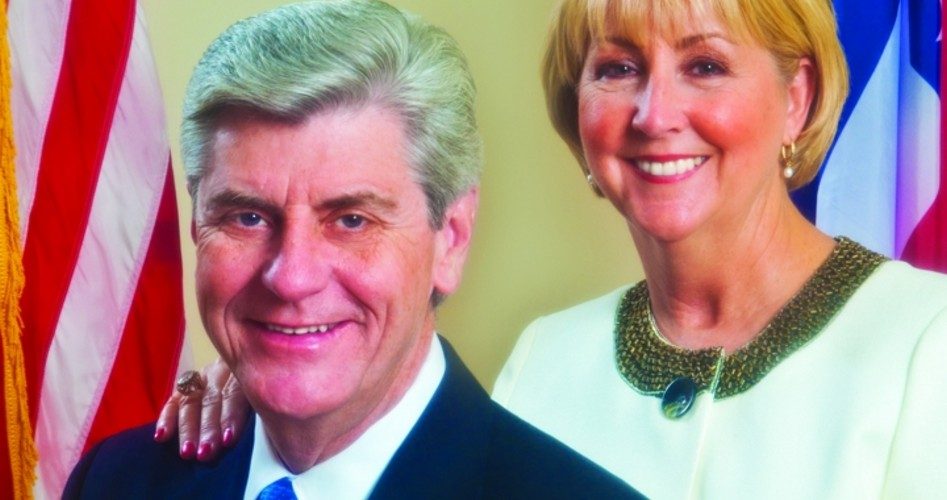
On Tuesday, Mississippi’s Republican Governor Phil Bryant (shown) signed into law a sweeping “religious liberty” bill that protects the religious convictions of individuals and businesses in the state. The bill passed both the House and Senate last week and reached the governor’s desk on Monday, prompting protests from critics who claim the bill is discriminatory because it allows individuals and groups to raise religious objections on LGBTQ issues.
HB 1523, the Religious Liberty Accommodations Act, states that public employees, businesses, and social workers cannot be punished for denying services to same-sex couples, or for acting on the belief that sexual relations should be reserved for marriage and that gender is determined at birth, the Washington Post reports.
The bill explicility outlines the specific protected religious beliefs, thereby undermining allegations that it is too broad. Section 2 of the bill reads:
The sincerely held religious beliefs or moral convictions protected by this act are the belief or conviction that:
(a) Marriage is or should be recognized as the union of one man and one woman;
(b) Sexual relations are properly reserved to such a marriage; and
(c) Male (man) or female (woman) refer to an individual’s immutable biological sex as objectively determined by anatomy and genetics at time of birth.
Critics argue that the bill is harmful to members of the LGBTQ community, but proponents note that the bill takes nothing away from those individuals, but simply protects the religious freedoms of those who do not wish to violate their own sense of morality.
“This is presenting a solution to the crossroads we find ourselves in today as a result of Obergefell v. Hodges,” Republican State Senator Jenifer Branning stated when she presented the bill to the Senate, the Jackson Clarion-Ledger reports. She explained, “Ministers, florists, photographers, people along those lines — this bill would allow them to refuse to provide marriage-related business services without fear of government discrimination.”
Branning continued, “It takes no rights away from anyone. It gives protection to those in the state who cannot in a good conscience provide services for a same-sex marriage,” according to New-York Magazine.
On Friday, Representative Andy Gipson explained that the bill’s intent is to protect people of faith. “Somebody asked me, ‘When did it become ok to discriminate against Christians?’ And that’s the issue at hand.”
Protesters gathered outside the governor’s mansion on Monday asking Governor Bryant to veto the bill. “All of the bill just seems so unfair to people who are just trying to live their lives, and it just seems like ways to discriminate instead of love people,” protester Laura Franey insisted.
But Governor Bryant told WLOX-TV, “I don’t think it’s discriminatory. I think it gives some people, as I appreciate it, the right to be able to say, ‘That’s against my religious beliefs and I don’t need to carry out that particular task.'”
After the signing ceremony, Governor Bryant issued the following statement, according to WDAM-7:
I am signing HB 1523 into law to protect sincerely held religious beliefs and moral convictions of individuals, organizations and private associations from discriminatory action by state government or its political subdivisions, which would include counties, cities and institutions of higher learning. This bill merely reinforces the rights which currently exist to the exercise of religious freedom as stated in the First Amendment to the U.S. Constitution.
This bill does not limit any constitutionally protected rights or actions of any citizen of this state under federal or state laws. It does not attempt to challenge federal laws, even those which are in conflict with the Mississippi Constitution, as the Legislature recognizes the prominence of federal law in such limited circumstances.
The legislation is designed in the most targeted manner possible to prevent government interference in the lives of the people from which all power to the state is derived.
According to the Washington Post, HB 1523 is one of approximately 10 bills that have been drafted by states in response to the Supreme Court decision on same-sex “marriage,” but is considered to be one of the most sweeping. The Post elaborates on the bill’s reach,
The bill protects doctors who refuse to provide counseling, sex-reassignment surgery, fertility treatments and other services based on their religious convictions, and allows companies and schools to establish sex-specific policies regarding dress and bathroom use. It allows state employees to recuse themselves from licensing or overseeing a same-sex marriage, so long as they take “all necessary steps” to ensure that the marriage isn’t impeded or delayed as a result. And it gives foster and adoptive families license to “guide, raise or instruct” children as they see fit, a rule that Human Rights Campaign argues would make LGBT children vulnerable to being forced into “conversion therapy.”
A religious liberties bill proposed in Georgia was recently vetoed by Republican Governor Nathan Deal. In North Carolina, Governor Pat McCrory signed a “bathroom bill” that mandates that all bathrooms in the state be separated by sex as determined at birth, prompting the entertainment company Lionsgate to shoot a pilot for a comedy in Canada instead.
Several organizations in Mississippi have voiced their opposition to the bill, including the Mississippi Manufacturers Association, MGM Resorts International, and Nissan North America.
But the bill found support among religious groups. “This is what that bill is all about, that honest people who have a legitimate objection have a course of action,” said William Perkins, of the Mississippi Baptist Convention. Perkins refuses to accept accusations that the bill is discriminatory, since it simply protects the religious beliefs of individuals who hold them deeply.
Likewise, Family Research Council President Tony Perkins applauded Bryant’s signature, asserting,
No person should be punished by the government with crippling fines, or face disqualification for simply believing what President Obama believed just a few years ago, that marriage is the union of a man and a woman
The law goes into effect July 1.




